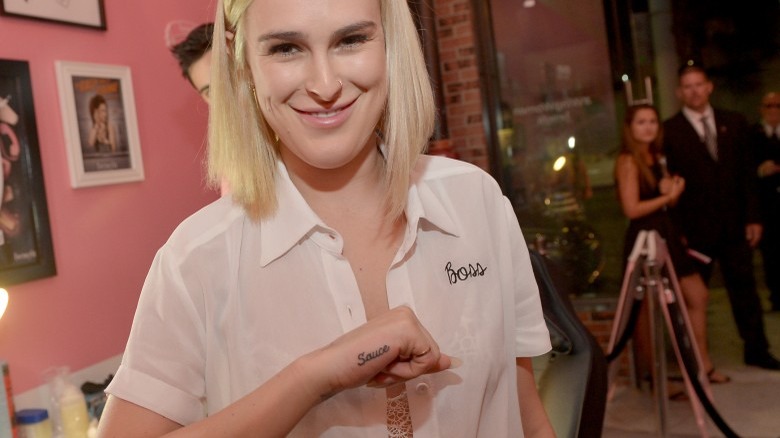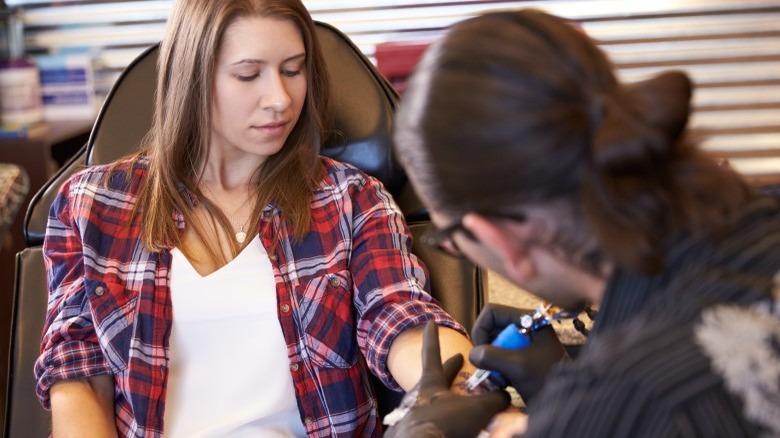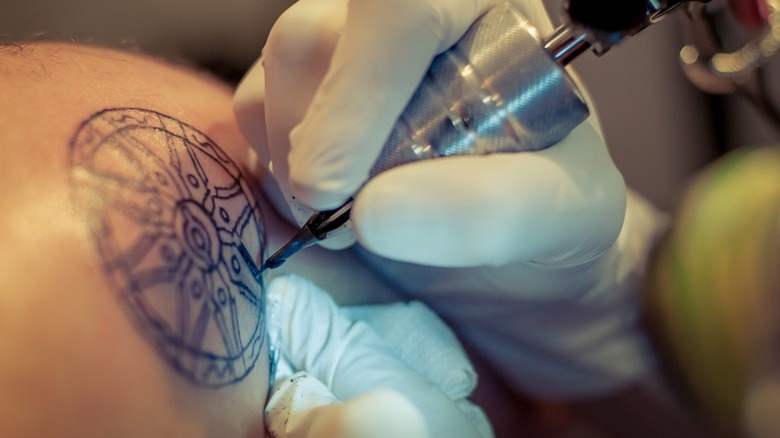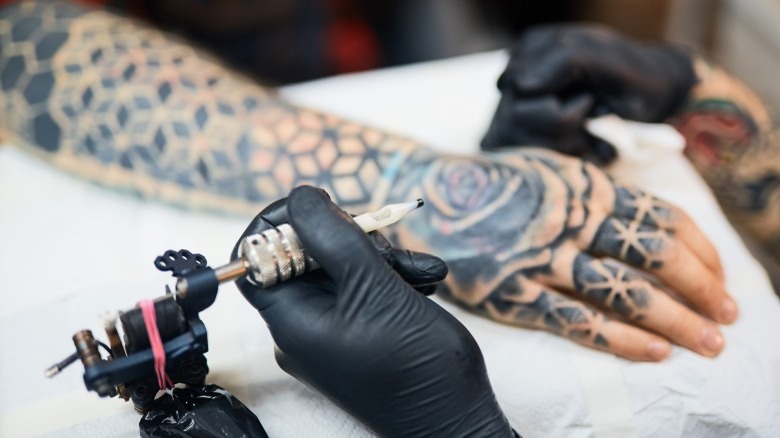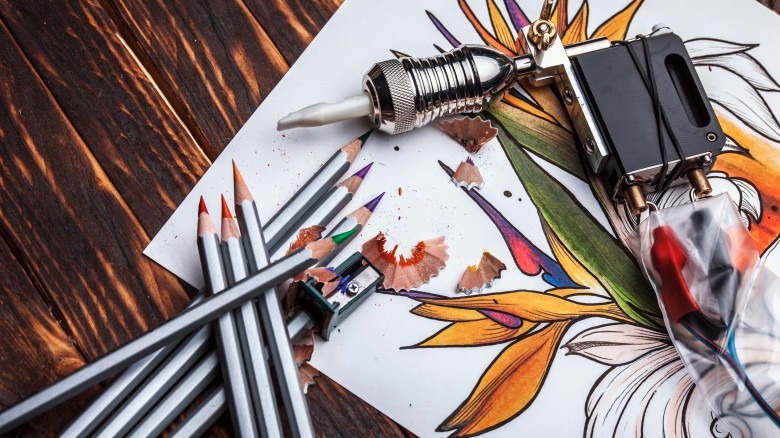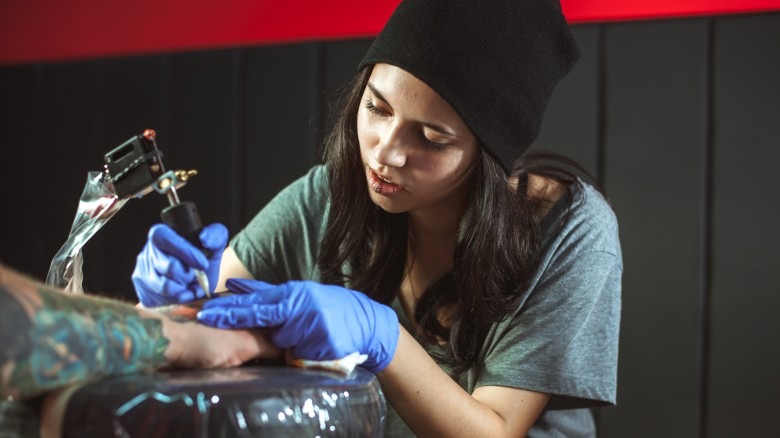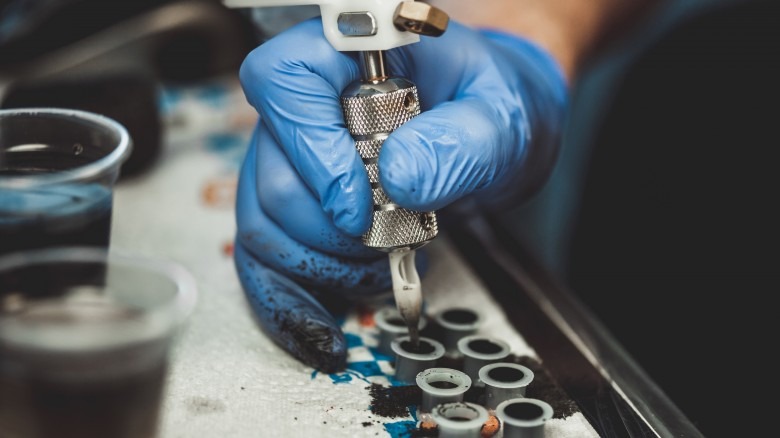Things Your Tattoo Artist Wishes You Knew
While it might not be as widely accepted as getting your ears pierced — yet — more and more people are taking the plunge when it comes to getting a tattoo. It can be a hugely intimidating process — tattoos are forever, after all. Whether you're a seasoned pro at sitting through the pain, or you're thinking about getting your very first piece done, there's an undeniable excitement that comes when you first sit down in the chair.
I've spent countless hours in that very spot — so many, that I've honestly lost count. Get a big enough piece done, and you might be spending days with your artist. That all got me thinking: what do tattoo artists really wish you knew the minute you walked through their door?
Don't be afraid to go bigger
A small tattoo might seem like it's all the commitment you're ready to make, but Annie Motel of Little Annie Motel Tattoo Parlor at Old Tradition Tattoo Shop in Hollywood, California, says that she wishes clients knew that small isn't always the best option.
"A lot of small tattoos look cute at first, but with the passage of time, they lose the details that make them special," she says. "Therefore, I often suggest getting a slightly bigger piece than the client's first idea. The other day, my client chose a design that I had drawn of a lovely mermaid who was covered in tattoos. The sizing of the piece needed to be big enough to showcase the detail. After the tattoo was finished, my client was totally in love with it, and I was pleased to know that the quality of the tattoo will withstand the test of time." Artists know how ink ages, what kinds of things will fade and distort, and how to keep tattoos looking fresh. Trust them!
Artists' fees may vary
Johnny Vampotna is an LA-based artist and painter who's traveled all over the world and whose work has been featured in numerous art galleries and magazines. For him, one of the trickiest parts of tattooing is a touchy subject: pricing.
"There's an old Sailor Jerry saying," he told me, "Good tattoos aren't cheap and cheap tattoos aren't good. I've had to stick to my guns over the years and train my clients into understanding how I price a tattoo by the piece and not by the hour, because I know more or less how fast or slow a piece will be. I don't think anyone wants to get paid half the amount for working efficiently," he says.
Some, like Vampotna, charge by the piece. Some charge by the hour, and others make it up as they go. In each case, they all have the experience to know what works best for them. Vampotna aims to provide an awesome experience for his clients, no matter what. "I always try to give my clients an overall fun, positive, personal, and memorable experience," he says.
Small tattoos might cost more than you think
If pricing is always tricky, pricing smaller tattoos is even trickier. Annie Motel says that the price might not be as low as you're expecting, and there's a good reason for that. "Sometimes, clients think that because the piece is small, I wouldn't need to charge the same amount as for something bigger," she says. "This is true, but we do still have to charge a shop minimum to cover supplies for each appointment."
Set-up for each appointment is the same no matter the size of the design — health and safety guidelines need to be met, and there is set-up, prep, sterilization, and supplies that still get used. Be confident in valuing your artist's time and creativity. You get what you pay for!
It's a creative collaboration
Becoming a working tattoo artist is harder than it looks, and at its heart, it's a creative occupation. Ask anyone who creates for a living, and they'll tell you that creativity on-demand can be a physically and mentally draining venture. "The physical toll is both a positive and negative at the same time," says Gordo from One Truth Tattoo in Northridge. "On one hand, clients push you to be creative and go beyond your comfort zone. On the other side, clients don't understand the time and effort that goes into a tattoo...Patience is a virtue, and I have to remind myself daily to be patient with everyone."
If you're getting a large, custom piece, you'll probably consult with your artist first, giving them some ideas on what you want. Then, the artist will get in touch with you when the design is ready for you to see. So, be patient and understanding that the process takes time — it's probably not the only piece that artist is working on.
Don't micromanage your artist
Tattoo artists aren't mind-readers, so communicating exactly what you have in mind, is key. But it's important to strike a balance between telling your artist what you want, and letting them do their job.
Oliver Kenton, a San Francisco-based artist who specializes in geometric and blackwork tattooing, says that it's helpful for you to remember the reason you chose your artist in the first place: something about their artwork spoke to you. And in order for artists to do their best work, don't micromanage. Share ideas, but let them do their job when it comes to things like details, precise placement, and colors.
"Let your artist be an artist," Kenton says. "If you've done your research and picked your artist out above all others, let them do their job and create a piece for you. You should always feel free to say that something is not to your liking," Kenton clarifies, "But micromanaging the process is a sure-fire way to lose your artist's trust." Trust goes both ways, and remember — they're creating art that you both will be proud of.
Speak up
Christina Hock of The Dolorosa Tattoo Company and Xinaxiii says that she hopes her clients always know that they can speak up with any questions or concerns that they might have — there's no such thing as a stupid question.
"Part of my job as a tattoo artist is to educate newcomers to tattooing, and build their trust by answering any questions they may have, and reassuring them that I want them to be happy with the design," she says. "My clients have chosen me and stuck with me throughout my 12 years of tattooing specifically for that reason. If questions do arise about my artistic style or placement of the tattoo, I make sure to answer and explain my reasons for design placement and color choices, at which point the final decision is left to the client."
Hock added. "At the end of the day, I want my clients to be happy to wear whatever design they may choose, even if that means a compromise."
Tip your artist
Sometimes tipping isn't just expected, it's needed — and your tattoo shop is one of those places. Making a living as a full-time tattoo artist likely means that that professional spent a long time as an apprentice. And if they don't own the shop at which you're getting tattooed, they're probably paying rent for the use of that chair you're sitting in. And, like any other small business owner, when you tip them? You're helping them keep their doors open.
"Tip your artist," says Oliver Kenton. "Tattooing is a very personal and labor-intensive job, and that little extra helps to form a lasting and positive experience with your artist. You've just taken home a priceless and permanent work of art that is yours forever, and a little extra at the end of your session is a small price to pay for that." How much should you tip? Tattoo shop etiquette recommends 15 to 20 percent. But if your artist goes above and beyond, don't hesitate to show the love.
There's a long process to going pro
There's no one set path to becoming a tattoo artist, but clients often underestimate how difficult it can be to get into the business — and then get good enough to make it your full-time job. Even once you're part of a shop, it's a constant process of building portfolios, creating new and innovative work, and putting yourself out there in all sorts of different ways.
Many artists — like Annie Motel — come from a fine art background and have degrees in art. (Hers is a BFA from the University of Washington, where she specialized in drawing, painting, and acting.) No matter the background, no one just jumps into a successful tattoo business. Regulations for artists vary by state, and at the very least, they're required to take classes in things like blood borne pathogens. Artists, shops, and shop owners must be licensed in accordance with local and state health departments. There's a good reason for all that paperwork you'll likely fill out before your session starts!
Use your common sense
When I reached out to a handful of different artists, some similar themes appeared in their responses. At the end of the day, most of the artists I spoke to wanted their clients — and potential clients — to get a handle on the groundwork for basic tattoo shop decency.
First, don't ask for a spec design, promising that if you like it, you'll make an appointment. Second, don't come in drunk, or hungover — and definitely don't come in sick. Also, try not to schedule appointments for the days you're going to have your period. (Pain will be magnified tenfold. Even areas that aren't especially sensitive to needles will become agonizing, especially if you're prone to aches, pains, and cramps on even the best of days.) Don't try to negotiate price. Don't bring a whole group of people with you, and definitely don't bring kids. Be prepared for the pain — you can handle it like a big kid. Lastly, don't ignore your artist's advice, or what they tell you about aftercare. Remember: you picked them for a reason.
Do your research, and pay it forward
Once you decide to get a tattoo, it's crucial to do your research and pick the right artist. Sometimes, that means talking to friends that know someone, or have experience with a particular shop. One time, I stopped someone on the street to ask him where he'd gotten his work done, and when he referred me to Hyperion Tattoo in Western New York, I made an appointment a few days later. You'll know when you've found the right artist. If there are doubts, keep looking. Remember that when you get a piece done, it's not only a representation of you, it also speaks for your artist.
Artists also rely heavily on word of mouth, and if you're happy with your piece, don't be afraid to refer someone else to your artist. It's a win-win, and it could result in a long-time relationship. Tattoos are addicting, after all. Once you find your style, there's no going back!

